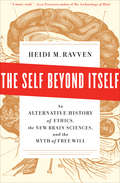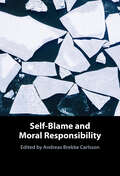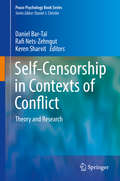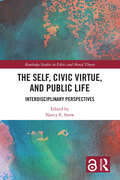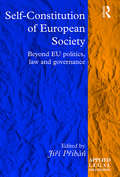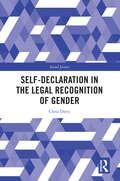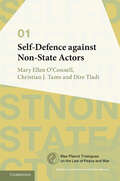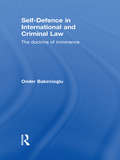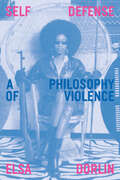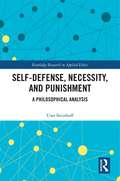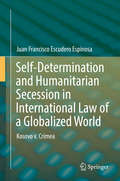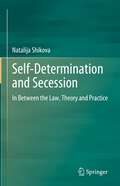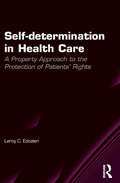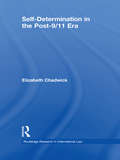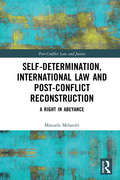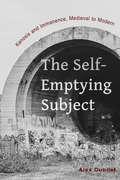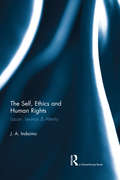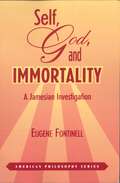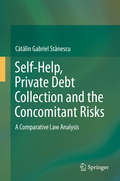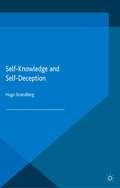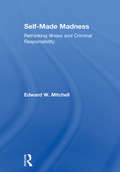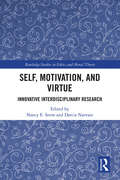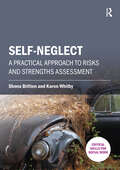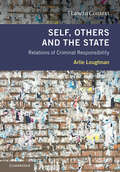- Table View
- List View
The Self Beyond Itself: An Alternative History of Ethics, the New Brain Sciences, and the Myth of Free Will
by Heidi M. Ravven&“Intertwines history, philosophy, and science . . . A powerful challenge to conventional notions of individual responsibility&” (Publishers Weekly). Few concepts are more unshakable in our culture than free will, the idea that individuals are fundamentally in control of the decisions they make, good or bad. And yet the latest research about how the brain functions seems to point in the opposite direction . . . In a work of breathtaking intellectual sweep and erudition, Heidi M. Ravven offers a riveting and accessible review of cutting-edge neuroscientific research into the brain&’s capacity for decision-making—from &“mirror&” neurons and &“self-mapping&” to surprising new understandings of group psychology. The Self Beyond Itself also introduces readers to a rich, alternative philosophical tradition of ethics, rooted in the writing of Baruch Spinoza, that finds uncanny confirmation in modern science. Illustrating the results of today&’s research with real-life examples, taking readers from elementary school classrooms to Nazi concentration camps, Ravven demonstrates that it is possible to build a theory of ethics that doesn&’t rely on free will yet still holds both individuals and groups responsible for the decisions that help create a good society. The Self Beyond Itself is that rare book that injects new ideas into an old debate—and &“an important contribution to the development of our thinking about morality&” (Washington Independent Review of Books). &“An intellectual hand-grenade . . . A magisterial survey of how contemporary neuroscience supports a vision of human morality which puts it squarely on the same plane as other natural phenomena.&” —William D. Casebeer, author of Natural Ethical Facts
Self-Blame and Moral Responsibility
by Andreas Brekke CarlssonSelf-blame is an integral part of our lives. We often blame ourselves for our failings and experience familiar unpleasant emotions such as guilt, shame, regret, or remorse. Self-blame is also what we often aim for when we blame others: we want the people we blame to recognize their wrongdoing and blame themselves for it. Moreover, self-blame is typically considered a necessary condition for forgiveness. However, until now, self-blame has not been an integral part of the theoretical debate on moral responsibility. This volume presents twelve new essays by leading moral philosophers, who set out bold new theories of the nature and ethics of self-blame, and the interconnection between self-blame and moral responsibility. The essays cast new light on traditional problems in the debate on moral responsibility and open new, exciting avenues for research in moral philosophy, moral psychology and the philosophy of punishment.
Self-Censorship in Contexts of Conflict
by Daniel Bar-Tal Keren Sharvit Rafi Nets-ZehngutThis groundbreaking volume explores the concept of self-censorship as it relates to individuals and societies and functions as a barrier to peace. Defining self-censorship as the act of intentionally and voluntarily withholding information from others in the absence of formal obstacles, the volumes introduces self-censorship as one of the socio-psychological mechanisms that prevent the free flow of information and thus obstruct proper functioning of democratic societies. Moreover it analyzes this socio-psychological phenomenon specifically in the context of intractable conflict, providing much evidence from the Israeli-Palestinian conflict. Moving from the micro to the macro level, the collected chapters put the individual as the focal unit of psychological analysis while embedding the individual in multiple levels of context including families, organizations, and societies. Following a firm conceptual explanation of self-censorship, a selection of both emerging and prominent scholars describe the ways in which self-censorship factors into families, organizations, education, academia, and other settings. Further chapters discuss self-censorship in military contexts, narratives of political violence, and the media. Finally, the volume concludes by looking at the ways in which harmful self-censorship in societies can be overcome, and explores the future of self-censorship research. In doing so, this volume solidifies self-censorship as an important phenomenon of social behavior with major individual and collective consequences, while stimulating exciting and significant new research possibilities in the social and behavioral sciences. Conceptually carving out a new area in peace psychology, Self Censorship in Contexts of Peace and Conflict will appeal to psychologists, sociologists, peace researchers, political scientists, practitioners, and all those with a wish to understand the personal and societal functioning of individuals in the real world.
The Self, Civic Virtue, and Public Life: Interdisciplinary Perspectives (Routledge Studies in Ethics and Moral Theory)
by Nancy E. SnowThis volume showcases new and interesting ways in which the possession of civic virtues can contribute to people’s abilities to engage in public life in meaningful ways.What is the role of civic virtues in public life? How does possessing civic virtues affect persons and their capacities for participation in the public order? The chapters in this volume combine philosophical and empirically informed work to show how civic virtues can be informed by larger virtue ethical perspectives. The first two chapters discuss virtues of individuals that have not received significant empirical attention—authenticity and wisdom and psychological resilience. The next two chapters address education and the ways in which civic virtues can help us to better serve schoolchildren who are socially and economically disadvantaged, as well as to broaden students’ horizons with respect to character and sustainability education. The final four chapters explore the roles for virtues within various political and public realms. They offer perspectives on how virtues affect contentious politics in democratic societies, and study virtues in contexts in which democracy has been stifled or torn apart by war. Together, the chapters highlight the ever-widening impact of the virtues on our lives and in society.The Self, Civic Virtue, and Public Life will be of interest to scholars and graduate students working in ethics, political philosophy, psychology, and philosophy of education.The Open Access version of this book, available at www.taylorfrancis.com, has been made available under a Creative Commons Attribution-Non Commercial-No Derivatives (CC-BY-NC-ND) 4.0 International license.
Self-Constitution of European Society: Beyond EU politics, law and governance (Applied Legal Philosophy)
by Jiří PřibáňRecent social and political developments in the EU have clearly shown the profound structural changes in European society and its politics. Reflecting on these developments and responding to the existing body of academic literature and scholarship, this book critically discusses the emerging notion of European constitutionalism, its varieties and different contextualization in theories of EU law, general jurisprudence, sociology of law, political theory and sociology. The contributors address different problems related to the relationship between the constitutional state and non-state constitutionalizations and critically analyze general theories of constitutional monism, dualism and pluralism and their juridical and political uses in the context of EU constitutionalism. Individual chapters emphasize the importance of interdisciplinary and socio-legal methods in the current research of EU constitutionalism and their potential to re-conceptualize and re-think traditional problems of constitutional subjects, limitation and separation of power, political symbolism and identity politics in Europe. This collection simultaneously describes the EU and its self-constitution as one polity, differentiated society and shared community and its contributors conceptualize the sense of common identity and solidarity in the context of the post-sovereign multitude of European society.
Self-Declaration in the Legal Recognition of Gender (Social Justice)
by Chris DietzSelf-Declaration in the Legal Recognition of Gender examines the impact of legislation premised upon the principle of ‘self-declaration’ of legal gender status. Existing doctrinal and comparative analyses have tended to come out strongly in favour of, or against, self-declaration. This book offers a socio-legal alternative which focuses on how self-declaration is experienced, on an embodied level, by trans and gender diverse people. It presents research conducted in Denmark, which became the first European state to adopt self-declaration in June 2014. By analysing Danish law through a Foucauldian framework which brings together socio-, feminist, and trans legal scholarship on embodiment and jurisdiction, the book offers the first empirically based and theoretically informed analysis of self-declaration. It draws upon legal consciousness, affect theory, vulnerability, and governmentality literatures to argue that the jurisdictional boundaries which existed between law and medicine were maintained throughout the reform process. This limited the impact of the legislation, enabling access to health care to be restricted in the same year in which amending legal gender status was liberalised. As the list of states that have adopted self-declaration increases, this intervention offers activists and policymakers insights which might shape how they respond to similar reform proposals in the future. A timely and important assessment, this book will appeal to researchers and practitioners working in trans, gender, feminist legal, and socio-legal studies.
Self-Defence against Non-State Actors: Volume 1 (Max Planck Trialogues #1)
by Mary Ellen O'Connell Christian J. Tams Dire TladiIn this book, self-defence against non-state actors is examined by three scholars whose geographical, professional, theoretical, and methodological backgrounds and outlooks differ greatly. Their trialogue is framed by an introduction and a conclusion by the series editors. The novel scholarly format accommodates the pluralism and value changes of the current era, a shifting world order and the rise in nationalism and populism. It brings to light the cultural, professional and political pluralism which characterises international legal scholarship and exploits this pluralism as a heuristic device. This multiperspectivism exposes how political factors and intellectual styles influence the scholarly approaches and legal answers and the trialogical structure encourages its participants to decentre their perspectives. By explicitly focussing on the authors' divergence and disagreement, a richer understanding of self-defence against non-state actors is achieved, and the legal challenges and possible ways ahead identified.
Self-Defence in International and Criminal Law: The Doctrine of Imminence
by Onder BakirciogluDrawing from scholarship across law, history, politics and philosophy, Self-Defence in International and Criminal Law provides a broad and interdisciplinary approach to the doctrine of self-defence in both domestic criminal and international law. It focuses on the requirement of imminence, which deals with the question of when individuals or States may legitimately resort to defensive force against a serious danger or harm. In both national and international law the imminence requirement, if strictly applied, renders any defensive measure taken in anticipation of a would-be attack illegal. Recently, however, attempts have been made to relax the temporal requirement of the self-defence doctrine (imminence) with a view to allowing individuals or States to employ deadly force to arrest an anticipated threat when they ‘believe’ that using ‘pre-emptive’ lethal force would be the only way to thwart an expected harm. In domestic criminal law, it has been argued that it is necessary to relax the rule of imminence in domestic violence cases where women employ lethal force against their abusive partners when there is no imminent threat to justify defensive force. At the international level, while there has long been controversy as to the justifiability of pre-emptive force in non-confrontational settings, following the September 11 attacks, the Bush Administration’s ‘war on terror’ policy radically shifted the focus from the notion of anticipation to that of prevention, making it clear that, if necessary, it would invoke unilateral force against emerging threats before they are fully formed. The book surveys the roots, role, rationale, and objectives of self-defence and questions whether the requirement of imminence should be removed from the traditional contours of the self-defence doctrine in national and international law.
Self Defense: A Philosophy of Violence
by Elsa DorlinA brilliant study of violent self-defense in the struggle for liberation by an award-winning philosopherIs violent self-defense ethical? In the history of colonialism, racism, sexism, capitalism, there has long been a dividing line between bodies "worthy of defending" and those who have been disarmed and rendered defenseless. In 1685, for example, France's infamous "Code Noir" forbade slaves from carrying weapons, under penalty of the whip. In nineteenth-century Algeria, the colonial state outlawed the use of arms by Algerians, but granted French settlers the right to bear arms. Today, some lives are seen to be worth so little that Black teenagers can be shot in the back for appearing "threatening" while their killers are understood, by the state, to be justified. That those subject to the most violence have been forcibly made defenseless raises, for any movement of liberation, the question of using violence in the interest of self-defense.Here, philosopher Elsa Dorlin looks across the global history of the left - from slave revolts to the knitting women of the French Revolution and British suffragists' training in ju-jitsu, from the Warsaw Ghetto Uprising to the Black Panther Party, from queer neighborhood patrols to Black Lives Matter, to trace the politics, philosophy, and ethics of self defense. In this history she finds a "martial ethics of the self": a practice in which violent self defense is the only means for the oppressed to ensure survival and to build a liveable future. In this sparkling and provocative book, drawing on theorists from Thomas Hobbes to Fred Hampton, Frantz Fanon to Judith Butler, Michel Foucault to June Jordan, Dorlin has reworked the very idea of modern governance and political subjectivity.Translated from the French by Kieran Aarons.
Self-Defense, Necessity, and Punishment: A Philosophical Analysis (Routledge Research in Applied Ethics)
by Uwe SteinhoffThis book offers a philosophical analysis of the moral and legal justifications for the use of force. While the book focuses on the ethics self-defense, it also explores its relation to lesser evil justifications, public authority, the justification of punishment, and the ethics of war. Steinhoff’s account of the moral use of force covers a wide range of topics, including the nature of justification in general, the precise elements of different justifications, the logic of claim- and liberty-rights and of rights forfeiture, the value of human life and its limits, and the princples of reciprocity and precaution. While the author’s analysis is primarily philosophical, it is informed by a metaethical stance that also places heavy emphasis on existing law and legal scholarship. In doing so, the book appeals to widely shared moral intuitions, precepts, and concepts grounded in criminal law. Self-Defense, Necessity, and Punishment offers the most comprehensive and systematic account of the ethics of self-defense. It will be of interest to scholars and graduate students working in applied ethics and moral philosophy, philosophy of law, and political philosophy.
Self-Determination and Humanitarian Secession in International Law of a Globalized World: Kosovo V. Crimea
by Juan Francisco Escudero EspinosaThis book addresses questions in connection with the international legal regime on demands for secession, which have arisen in various States. More specifically, it examines the unilateral declarations of independence by Kosovo in 2008, and by Crimea and its subsequent annexation by the Russian Federation in 2014. The work investigates the two cases so as to shed light on the international legal regime affecting entities that are smaller than a sovereign State. It analyzes the relevant principles of international law, the intention being to determine their scope and review them in light of the most recent practice and developments in international law. In turn, the book examines and explains the events of relevance for international law that occurred in the changing situations in Kosovo and Crimea. On the basis of these legal considerations, it explores how the international community can respond when faced with situations that may violate international law, together with the effectiveness of various measures. It also discusses whether certain situations might be legitimate as a concept could now be emerging that secession may be justified in specific circumstances, such as serious and widespread violations of basic human rights.
Self-Determination and Secession: In Between the Law, Theory and Practice
by Natalija ShikovaThis book offers a comprehensive summary of extant international law scholarship on the topics of self-determination and secession and positions the concepts among present-day theory and relevant practice, illustrated through various ongoing cases and historical examples. The right to self-determination is among the least understood rights within international law. Theoretical dilemmas – as to whether there is a link between self-determination and secession – are nothing new. In essence, self-determination is a much broader concept than secession and obtaining independent statehood. Unilateral secession is not prohibited by international law, but neither is it per se welcomed or accepted in practice. Beyond the context of decolonization, secession claims have long been viewed with disapproval in international law, and lawyers have been extremely skeptical about the issue. Although this is still the case, there are also new trends and opportunities to explore situations in which secession can be accepted, legitimized, or even legally permissible. The yardstick for this is the diplomatic response to secessionism and the growing involvement of the international community in mediation and conflict resolution. Though finding solutions can be difficult, within the existing frame, the ongoing tension between the duty of every society to recognize pluralism and diversity on the one hand, and the inherent desire of every culture – whether majority, minority or indigenous – to protect its values and ensure conformity on the other, must be resolved. The practices and modalities that envisage the internal dimension of the right to self-determination as a right that is exercised within the state borders can offer such opportunities. The appropriate role of the state and the international community is to serve as mediators between competing forces and to set parameters that can transform destructive conflicts into productive political models.
Self-determination in Health Care: A Property Approach to the Protection of Patients' Rights
by Leroy C. EdozienIt is generally accepted in legal and bioethical discourse that the patient has a right to self-determination. In practice though, this is often not the case. Paternalism is waning and it is increasingly recognised that there are values other than medical factors which determine the choices that patients make. Unfortunately, these developments have not resulted in huge advances for patient self-determination, which is largely because the consent model has fundamental flaws that constrain its effectiveness. This book sets out to offer an alternative model to consent. In the property model proposed here, the patient’s bodily integrity is protected from unauthorised invasion, and their legitimate expectation to be provided with the relevant information to make an informed decision is taken to be a proprietary right. It is argued that the property model potentially overcomes the limitations of the consent model, including the obstacle caused by the requirement to prove causation in consent cases. The author proposes that this model could in the future provide an alternative or complementary approach for the courts to consider when dealing with cases relating to self-determination in health care.
Self-Determination in the Post-9/11 Era (Routledge Research in International Law)
by Elizabeth ChadwickThis book discusses the increasing tendency in certain government quarters to incorporate struggles by peoples for their self-determination into the wider anti-terrorist agenda of the post-9/11 era. This tendency distorts the laws of armed conflict and of peace alike. As inter-state anti-terrorist co-operation becomes more extensive, the transaction costs of international peace and security between states increase. Modes of domestic state governance are left increasingly to the vagaries of inter-state non-interference in the domestic affairs of each other. The ‘war on terror’ and an increasingly strict, domestic state law-and-order approach to silence political opponents increases the dangers for civilians, eliminates rights, and generates suspect communities. At the same time, public institutions and private corporations are harnessed into the mechanics of a broad project of prevention and control. Distinctively, the book considers the impact of the recent ‘war on terror’ on the politics of the self-determination of peoples. It draws together issues related to governmental forceful action, an increasing intolerance towards non-state violent acts, the content of international and regional codifications, expansions in state discretion, the encroachment of surveillance powers, and the interaction and overlap between intelligence and law enforcement agencies. Self-Determination in the Post-9/11 Era will be of interest to students and scholars of public international law, criminology, comparative criminal justice, terrorism and national security, politics, international relations, human rights, governance and public policy.
Self-Determination, International Law and Post-Conflict Reconstruction: A Right in Abeyance (Post-Conflict Law and Justice)
by Manuela MelandriThe right to self-determination has played a crucial role in the process of assisting oppressed people to put an end to colonial domination. Outside of the decolonization context, however, its relevance and application has constantly been challenged and debated. This book examines the role played by self-determination in international law with regard to post-conflict state building. It discusses the question of whether self-determination protects local populations from the intervention of international state-builders in domestic affairs. With a focus on the right as it applies to the people of an independent state, it explores how self-determination concerns that arise in the post-conflict period play out in relation to the reconstruction process. The book analyses the situation in Somalia as a means of drawing out the impact and significance of the legal principle of self-determination in the process of rebuilding post-conflict institutions. In so doing, it seeks to highlight how the relevance of self-determination is often overlooked in this context.
The Self-Emptying Subject: Kenosis and Immanence, Medieval to Modern
by Alex DubiletAgainst the two dominant ethical paradigms of continental philosophy–Emmanuel Levinas’s ethics of the Other and Michel Foucault’s ethics of self-cultivation—The Self-Emptying Subject theorizes an ethics of self-emptying, or kenosis, that reveals the immanence of an impersonal and dispossessed life “without a why.” Rather than aligning immanence with the enclosures of the subject, The Self-Emptying Subject engages the history of Christian mystical theology, modern philosophy, and contemporary theories of the subject to rethink immanence as what precedes and exceeds the very difference between the (human) self and the (divine) other, between the subject and transcendence. By arguing that transcendence operates and subjects life in secular no less than in religious domains, this book challenges the dominant distribution of concepts in contemporary theoretical discourse, which insists on associating transcendence exclusively with religion and theology and immanence exclusively with modern secularity and philosophy.The Self-Emptying Subject argues that it is important to resist framing the relationship between medieval theology and modern philosophy as a transition from the affirmation of divine transcendence to the establishment of autonomous subjects. Through an engagement with Meister Eckhart, G.W.F. Hegel, and Georges Bataille, it uncovers a medieval theological discourse that rejects the primacy of pious subjects and the transcendence of God (Eckhart); retrieves a modern philosophical discourse that critiques the creation of self-standing subjects through a speculative re-writing of the concepts of Christian theology (Hegel); and explores a discursive site that demonstrates the subjecting effects of transcendence across theological and philosophical operations and archives (Bataille). Taken together, these interpretations suggest that if we suspend the antagonistic relationship between theological and philosophical discourses, and decenter our periodizing assumptions and practices, we might encounter a yet unmapped theoretical fecundity of self-emptying that frees life from transcendent powers that incessantly subject it for their own ends.
The Self, Ethics & Human Rights
by Joseph IndaimoThis book explores how the notion of human identity informs the ethical goal of justice in human rights. Within the modern discourse of human rights, the issue of identity has been largely neglected. However, within this discourse lies a conceptualisation of identity that was derived from a particular liberal philosophy about the ‘true nature’ of the isolated, self-determining and rational individual. Rights are thus conceived as something that are owned by each independent self, and that guarantee the exercise of its autonomy. Critically engaging this subject of rights, this book considers how recent shifts in the concept of identity and, more specifically, the critical humanist notion of ‘the other’, provides a basis for re-imagining the foundation of contemporary human rights. Drawing on the work of Jacques Lacan and Emmanuel Levinas, an inter-subjectivity between self and other ‘always already’ marks human identity with an ethical openness. And, this book argues, it is in the shift away from the human self as a ‘sovereign individual’ that human rights have come to reflect a self-identity that is grounded in the potential of an irreducible concern for the other.
Self-Fulfillment
by Alan GewirthCultures around the world have regarded self-fulfillment as the ultimate goal of human striving and as the fundamental test of the goodness of a human life. The ideal has also been criticized, however, as egotistical or as so value-neutral that it fails to distinguish between, for example, self-fulfilled sinners and self-fulfilled saints. Alan Gewirth presents here a systematic and highly original study of self-fulfillment that seeks to overcome these and other arguments and to justify the high place that the ideal has been accorded. He does so by developing an ethical theory that ultimately grounds the value of self-fulfillment in the idea of the dignity of human beings. Gewirth begins by distinguishing two models of self- fulfillment--aspiration-fulfillment and capacity-fulfillment--and shows how each of these contributes to the intrinsic value of human life. He then distinguishes between three types of morality--universalist, particularist, and personalist--and shows how each contributes to the values embodied in self-fulfillment. Building on these ideas, he develops a Odialectical' conception of reason that shows how human rights are central to self-fulfillment. Gewirth also argues that self-fulfillment has a social as well as an individual dimension: that the nature of society and the obstacles that disadvantaged groups face affect strongly the character of the self-fulfillment that persons can achieve. Bold in scope and rigorous in execution, Self-Fulfillment is a powerful new contribution to moral, social, and political philosophy.
Self, God and Immortality: A Jamesian Investigation (American Philosophy #Vol. 12)
by Eugene FontinellCan we who have been touched by the scientific, intellectual, and experimental revolutions of modern and contemporary times still believe with and degree of coherence and consistency that we as individual persons are immortal. Indeed, is there even good cause to hope that we are? In examining the present relationship of reason to faith, can we find justifying reasons for faith? These are the central questions in Self, God, and Immortality, a compelling exercise in philosophical theology. Drawing upon the works of William James and the principles of American Pragmatism, Eugene Fontinell extrapolates carefully from "data given in experience" to a model of the cosmic process open to the idea that individual identity may survive bodily dissolution. Presupposing that the possibility of personal immortality has been established in the first part, the second part of the essay is concerned with desirability. Here, Fontinell shows that, far from diverting attention and energies from the crucial tasks confronting us here and now, such belief can be energizing and life enhancing. The wider importance of Self, God, and Immortality lies in its pressing both immortality-believers and terminality-believers to explore both the metaphysical presuppositions and the lived consequences of their beliefs. It is the author's expressed hope that such explorations, rather than impeding, will stimulate co-operative efforts to create a richer and more humane community.
Self-Help, Private Debt Collection and the Concomitant Risks
by Cӑtӑlin Gabriel StӑnescuThe book shows that self-help in commercial law is a fast, inexpensive and efficient alternative to court enforcement. Self-help remedies and private debt collection are largely but not exclusively features of common law jurisdictions, since remnants of private enforcement can still be found in contract law in civilian systems. The book argues that - despite their usefulness - self-help and private debt collection entail significant risks, especially for consumer debtors. This means that private enforcement needs to be accompanied by the introduction of tailor-made consumer-debtor protection regulation. Specific attention is given to factoring, which functions in many instances as a form of pseudo-private debt collection and which has been exploited to bypass sector-specific consumer protection regulations.
Self-Knowledge and Self-Deception
by Hugo StrandbergThe aim of this book is to acquire a better understanding of the question 'who am I?' By means of the concepts of self-knowledge and self-deception questions about the self are studied. The light in which its topic is seen is the light of love, the light in which other people really become visible and so oneself in one's relation to them.
Self-Made Madness: Rethinking Illness and Criminal Responsibility
by Edward W. MitchellThis multi-disciplinary book lies in the general areas of forensic psychiatry/psychology, sociology, jurisprudence, criminal law and criminology. It questions traditional assumptions about illness and mental disorder, and deals with the controversial notion that mental disorders (and possibly other 'illnesses') may be to varying extents the fault of the 'sufferer'. It examines how the law can take into account such 'culpable' notions of mental disorder in determining criminal responsibility. This culpability for the defense-causing condition (or 'responsibility for level of criminal responsibility') is called 'meta-responsibility'. The book is divided into two parts. The first section discusses theoretical issues, such as the manner in which traditional illness models relate to meta-responsibility; the insanity defence and other mental condition defences; the relationship of clinical issues such as medication non-compliance and insight to meta-responsibility and the counterfactual notion that consideration of the possible voluntary origins of mental disorder may benefit the criminal and non-criminal mentally disordered. The second section of the book presents a case vignette experiment of mock jurors, examining the effect of a 'meta-responsibility insanity test'.
Self, Motivation, and Virtue: Innovative Interdisciplinary Research (Routledge Studies in Ethics and Moral Theory)
by Nancy E. Snow Darcia NarvaezThis volume features new findings by nine interdisciplinary teams of researchers on the topics of self, motivation, and virtue. Nine chapters bringing together scholars from the fields of philosophy, psychology, neuroscience, and sociology advance our substantive understanding of these important topics, and showcase a variety of research methods of interdisciplinary interest. Essays on Buddhism and the self in the context of romantic relationships, the development of personal projects and virtue, the notion of self-distancing and its moral impact, virtues as self-integrated traits, humility and the self in loving encounter, the importance of nation and faith in motivating virtue in western and non-western countries, roles for the self and virtue in eudaimonic growth, overcoming spiritual violence and sacramental shame in Christian communities, and an investigation into the moral self highlight the range and diversity of topics explored in this volume. The concept of deep integration also characterizes this work: each member of the interdisciplinary teams was fully and equally invested in their project from inception to completion. This approach invites teams to examine their disciplinary assumptions, rethink familiar concepts, and adjust methodologies in order to view their topics with fresh eyes. The result is not only new findings of substantive and methodological interest, but also an interesting glimpse into the thinking of the researchers as they sought interdisciplinary common ground in their research. Self, Motivation, and Virtue will be of interest to scholars in philosophy, moral psychology, neuroscience, and sociology who are working on these topics.
Self-neglect: A Practical Approach to Risks and Strengths Assessment (Critical Skills for Social Work)
by Shona Britten Karen WhitbySelf-neglect covers a wide range of behaviours, from neglecting to care for one's personal hygiene and health to one's surroundings; this can include behaviours such as hoarding of objects and/or animals. As presentation of self-neglect cases vary greatly, assessment and support planning should be made on an individualised case by case basis.Self-neglect describes a Risks and Strengths assessment model which has been developed by practitioners as an aid to frontline workers across all sectors, as well as agencies holding responsibilities in Safeguarding Adults. It aims to support and structure the effective, timely and consistent assessment of risk in relation to key social and healthcare factors of self-neglect both on an individual case level and at a strategic level in contributing to community/locality needs analysis and reporting mechanisms; including annual Safeguarding Adults Board Reports.
Self, Others and the State: Relations of Criminal Responsibility (Law in Context)
by Arlie LoughnanCriminal responsibility is now central to criminal law, but it is in need of re-examination. In the context of Australian criminal laws, Self, Others and the State reassesses the general assumptions made about the rise to prominence of criminal responsibility in the period since around the turn of the twentieth century. It reconsiders the role of criminal responsibility in criminal law, arguing that criminal responsibility is significant because it organises key sets of relations - between self, others and the state - as relations of responsibility. Detailed studies of decisive moments and developments since the turn of the twentieth century, and original explorations of relations of responsibility, expose the complexity and dynamism of criminal responsibility and reveal that it is the means by which matters of subjectivity, relationality and power make themselves felt in the criminal law.
